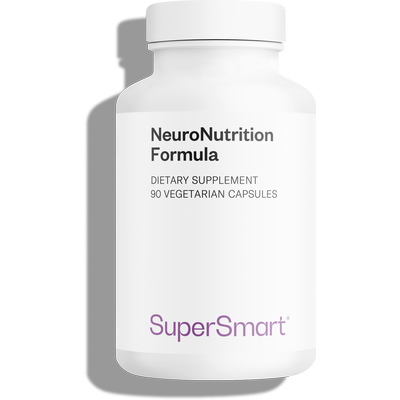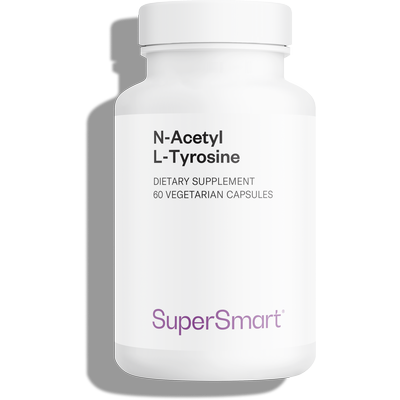Phenylalanine: definition, benefits & diet
Little known yet essential! Phenylalanine is the amino acid that boosts your motivation, enlightens your mind and supports your mental well-being. Discover its unsuspected benefits and where to find it in foods.

What is phenylalanine?
Definition of phenylalanine
Phenylalanine is a so-called ‘essential’ amino acid: it is essential for the body to function properly, but must be provided in the diet as the body cannot manufacture it itself.
More specifically, it plays a key role in the brain, affecting essential functions such as motivation, attention and mental well-being.
A key player in the production of neurotransmitters
As well as being a component of proteins, phenylalanine is essential for the production of tyrosine, another amino acid that helps to produce all kinds of neurotransmitters and hormones:
- adrenaline (or epinephrine), a hormone secreted when under stress or in preparation for physical activity
- noradrenaline, which plays a role in arousal, selective attention, vigilance, emotions, the sleep/wake transition, learning, etc.
- dopamine, a neurotransmitter that plays a decisive role in behaviour, motivation and risk-taking
- melanin, the natural pigment responsible for our skin colour
- thyroid hormones, which act on the body to increase basic metabolism, affect protein production and make the body more receptive to certain hormones
The role of phenylalanine hydroxylase
In the body, phenylalanine is converted into tyrosine by an enzyme found in the liver: phenylalanine hydroxylase (1).
This enzyme sometimes fails, leading to a rare genetic disease known as phenylketonuria (PKU), which may cause serious neurological complications. It affects one in 16,000 newborns and can lead to severe mental disability if left untreated.
What are the sources of phenylalanine?
The 15 foods richest in this amino acid
Since the body is not capable of manufacturing phenylalanine, and since it plays a decisive role in cognitive function, we need to regularly consume foods containing it.
These are mainly protein- and peptide-rich foods of animal and plant origin (particularly legumes).
Here is a list of 15 potential sources, ranked from the richest to the least rich in phenylalanine:
- beef, 2400 mg per portion (150 g)
- tofu, 2,334 mg per portion (100 g)
- poultry, 2330 mg per portion (150 g)
- mung beans, 1,473 mg per portion (100 g)
- lentils, 1,383 mg per portion (100 g)
- salmon, 1,100 mg per portion (100 g)
- eggs, 967 mg per portion (3 eggs)
- milk, 873 mg per portion (50 cl)
- Parmesan cheese, 680 g per portion (30 g)
- leeks, 559 mg per portion (100 g)
- peppers, 550 mg per portion (100 g)
- walnuts, 437 mg per portion (30 g)
- Brie cheese, 350 mg per portion (30 g)
- feta cheese, 270 mg per portion (40 g)
- spirulina, 83 mg per portion (3 g)
However, beware of excessive protein consumption, which, if prolonged, can contribute to premature ageing through mechanisms such as oxidative stress, renal overload and metabolic dysfunctions.
Daily phenylalanine requirements
By way of information, the phenylalanine intake required by a healthy adult varies from 1,000 to 3,500 mg per day (39 mg/kg according to the WHO), depending on the research carried out and the individual's weight.
Increasing tyrosine intake
There is a possible solution: you can slightly reduce your consumption of these foods if you increase your tyrosine intake at the same time.
Tyrosine is found in meat, almonds, avocado, bananas, cheeses (especially hard cheeses), soya and seeds (pumpkin, sesame, sunflower, etc.).
This approach is particularly useful for people suffering from PKU.
Can I take phenylalanine supplements?
Phenylalanine-rich food supplements for the brain
In general, sources of phenylalanine are sufficiently numerous and varied to avoid deficiencies and provide the daily intake needed to manufacture tyrosine.
There are, however, brain nutrition supplements containing phenylalanine, which are reputed to act progressively and to be ideal over the long term (the synergistic NeuroNutrition Formula, for example, combines phenylalanine with other compounds studied for their role in cognitive health and mental well-being: L-pyroglutamic acid, sodium R-lipoate, etc.).
Of course, people with PKU should avoid phenylalanine supplements, as their bodies cannot metabolise it properly.
Tyrosine food supplements
Given its direct role in endogenous hormone production, brain performance and protein synthesis, tyrosine itself is used in the composition of many dietary supplements, in its active levorotatory form: L-tyrosine.
Tyrosine supplements are therefore particularly popular with sports enthusiasts and people concerned about their cognitive abilities (L-Tyrosine, for example).
The action of tyrosine supplements is reputed to be faster than that of phenylalanine supplements.
Increased blood levels of tyrosine and effects on cognition and mood
As early as the 1980s, studies showed that phenylalanine or tyrosine supplementation resulted in an increase in tyrosine levels in the blood, one hour after ingestion and up to 8 hours afterwards (2).
Other studies have subsequently evaluated the level of neurotransmitters synthesised from this tyrosine and their potential benefits in conditions marked by low levels of neurotransmitters (3-5), including fatigue linked to intense physical activity, emotional or mental exhaustion, cognitive stress and mood problems.
SUPERSMART ADVICE
References
- Berg JM, Tymoczko JL et Stryer L (2013) 'Biochimie.' 7e edn. (Lavoisier).
- Jongkees, B. J., Hommel, B., Kühn, S., & Colzato, L. S. (2015). Effect of tyrosine supplementation on clinical and healthy populations under stress or cognitive demands—A review. Journal of Psychiatric Research, 70, 50–57. doi:10.1016/j.jpsychires.2015.08.014
- Mahoney CR, Castellani J, Kramer FM, Young A, Lieberman HR. Tyrosine supplementation mitigates working memory decrements during cold exposure. Physiol Behav. 2007 Nov 23;92(4):575-82. doi: 10.1016/j.physbeh.2007.05.003. Epub 2007 May 22. PMID: 17585971.
- Bryant J. Jongkees, Bernhard Hommel, Simone Kühn, Lorenza S. Colzato, Effect of tyrosine supplementation on clinical and healthy populations under stress or cognitive demands—A review, Journal of Psychiatric Research, Volume 70, 2015, Pages 50-57, ISSN 0022-3956, https://doi.org/10.1016/j.jpsychires.2015.08.014.
- Steenbergen L, Sellaro R, Hommel B, Colzato LS. Tyrosine promotes cognitive flexibility: evidence from proactive vs. reactive control during task switching performance. Neuropsychologia. 2015 Mar;69:50-5. doi: 10.1016/j.neuropsychologia.2015.01.022. Epub 2015 Jan 16. PMID: 25598314.
Keywords
15 Hours
Just OK
Just OK, ordering from company for many years and being safisfied
Lynn Mae
1 Days
Recomendo
Produtos encomendados são recebidos atempadamente e de acordo com o anunciado! Muito satisfeita!
Carla Sofia
1 Days
Everything is great!
Everything is great!
Jonas
6 Days
The delivery was fast and the product…
The delivery was fast and the product is great
SOMMARIVA Gianni
7 Days
Great service and lots of information
Great service and lots of information
Gabi
10 Days
Service Satisfaction
I’m satisfied with the service; it fulfilled what it set out to do.
Anfhony Abreu
13 Days
Original product and fast delivery
Original product and fast delivery. I haven't started it yet, but will do soon.
Vincenza Catania
16 Days
Good quality
Good quality. Good service.
Leonel Guzman
18 Days
Top!!!!!!!!
Top!!!!!!!!
Michael
20 Days
Excellent!
Products are great and delivered fast!
PARDINI Debora
21 Days
From order to receive the product
From order to receive the product, the process is smooth & fast. It’s good to customers.
WONG Mei Ling
22 Days
Fast delivery
very quick delivery to italy. product is good.
Customer
23 Days
Prompt delivry !!👍
Prompt delivry !!👍
SWEET Christine
23 Days
Good delivery and flawless quality
AS far as delivery and the visual quality are concerned, Supersmart is excellent. I will not comment on the efficacy of the products themselves, since that is only possible over a longer period and in a large customer base compared to people who do not consume a particular product.
Roger De Backer
24 Days
Perfect services
Perfect services, perfect support, great articles about products
Michaela Alali Beitlová
of experience
your money back
##montant## purchase






